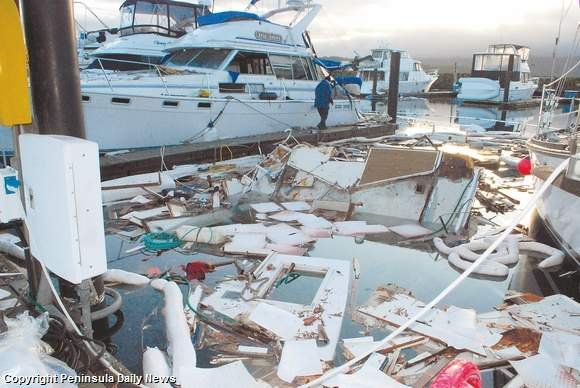FF
Guru
- Joined
- Oct 12, 2007
- Messages
- 22,552
After posting for years about the advantages of a propane reefer,, I found some info on an RV site that might be useful to folks making a decision. Boondocking is same as anchoring out.
Sure one can kill oneself with stupidity , but a proper installation can be safe as so many folks with propane ranges have shown.
**********
Propane vs 12 volt power.
A gallon of propane contains 91,500 BTU.
A typical "full" tank of propane contains about 4.5 gallons (+/-)
4.5 gallons of propane contains 411,750 BTU.
A 2109S has two of these = 823,500 BTU.
That means you have 241,344 watts (or 241.3 kilowatt hours) of energy sitting on the tongue of your RV. https://www.rapidtables.com/convert/...U_to_Watt.html
So in electrical terms at 12 volts, 241,344 watts per hour = 20,112 amp hours. Let me repeat: Twenty THOUSAND amp hours!
https://www.rapidtables.com/calc/ele...alculator.html
The typical 12 volt group 24 battery that comes standard from the dealer puts out a measly 35 USABLE amp hours.
Until recently, the GOLD STANDARD for battery banks was 4 x 6 volt GC2 golf cart batteries in series/parallel that could deliver a whopping 230 USABLE amp hours. You don't have room on your tongue for that battery bank. You SHOULD install 2 x 6 volt GC2s that will reliably deliver 115 usable amp hours.
But think about it: Two "5-gallon" tanks of propane contain the equivalent of 87 of the gold standard battery banks!! These days, you can do better on batteries with LiFePo4 lithium batteries at roughly a kilobuck a pop. https://www.google.com/search?q=batt...hrome&ie=UTF-8 But they cannot compete with propane for usable energy storage.
If you have money to burn, get the 12 volt compressor fridge, a couple of LiFePo4s, and a good solar array to keep it running.
Solar? If you boondock, absolutely. This is a fantastic deal on great equipment: https://smile.amazon.com/Renogy-Sola...s%2C225&sr=8-5
Buy it while you can.
A pair of 6 volt GC2s? Absolutely...or spring for the LiFePo4s. A good long term investment. I have a pair of these: https://www.batteriesplus.com/productdetails/sligc115 I'm a profligate 12 volt power user...stereo, lights, even a 500 watt inverter powering an electric blanket for 20 minutes to take the chill off the bed. I have power to spare and in sunny Colorado, my batteries are topped off by about 1 PM.
But if you want hassle free refrigeration off the grid, propane is the way to go. And you can safely run it while towing. Another topic, but virtually everyone in the forum will confirm that this works well. Shut it down if you stop for gasoline, go thru a tunnel, or ride a ferry. Otherwise, no big deal.
Sure one can kill oneself with stupidity , but a proper installation can be safe as so many folks with propane ranges have shown.
**********
Propane vs 12 volt power.
A gallon of propane contains 91,500 BTU.
A typical "full" tank of propane contains about 4.5 gallons (+/-)
4.5 gallons of propane contains 411,750 BTU.
A 2109S has two of these = 823,500 BTU.
That means you have 241,344 watts (or 241.3 kilowatt hours) of energy sitting on the tongue of your RV. https://www.rapidtables.com/convert/...U_to_Watt.html
So in electrical terms at 12 volts, 241,344 watts per hour = 20,112 amp hours. Let me repeat: Twenty THOUSAND amp hours!
https://www.rapidtables.com/calc/ele...alculator.html
The typical 12 volt group 24 battery that comes standard from the dealer puts out a measly 35 USABLE amp hours.
Until recently, the GOLD STANDARD for battery banks was 4 x 6 volt GC2 golf cart batteries in series/parallel that could deliver a whopping 230 USABLE amp hours. You don't have room on your tongue for that battery bank. You SHOULD install 2 x 6 volt GC2s that will reliably deliver 115 usable amp hours.
But think about it: Two "5-gallon" tanks of propane contain the equivalent of 87 of the gold standard battery banks!! These days, you can do better on batteries with LiFePo4 lithium batteries at roughly a kilobuck a pop. https://www.google.com/search?q=batt...hrome&ie=UTF-8 But they cannot compete with propane for usable energy storage.
If you have money to burn, get the 12 volt compressor fridge, a couple of LiFePo4s, and a good solar array to keep it running.
Solar? If you boondock, absolutely. This is a fantastic deal on great equipment: https://smile.amazon.com/Renogy-Sola...s%2C225&sr=8-5
Buy it while you can.
A pair of 6 volt GC2s? Absolutely...or spring for the LiFePo4s. A good long term investment. I have a pair of these: https://www.batteriesplus.com/productdetails/sligc115 I'm a profligate 12 volt power user...stereo, lights, even a 500 watt inverter powering an electric blanket for 20 minutes to take the chill off the bed. I have power to spare and in sunny Colorado, my batteries are topped off by about 1 PM.
But if you want hassle free refrigeration off the grid, propane is the way to go. And you can safely run it while towing. Another topic, but virtually everyone in the forum will confirm that this works well. Shut it down if you stop for gasoline, go thru a tunnel, or ride a ferry. Otherwise, no big deal.
Last edited:

